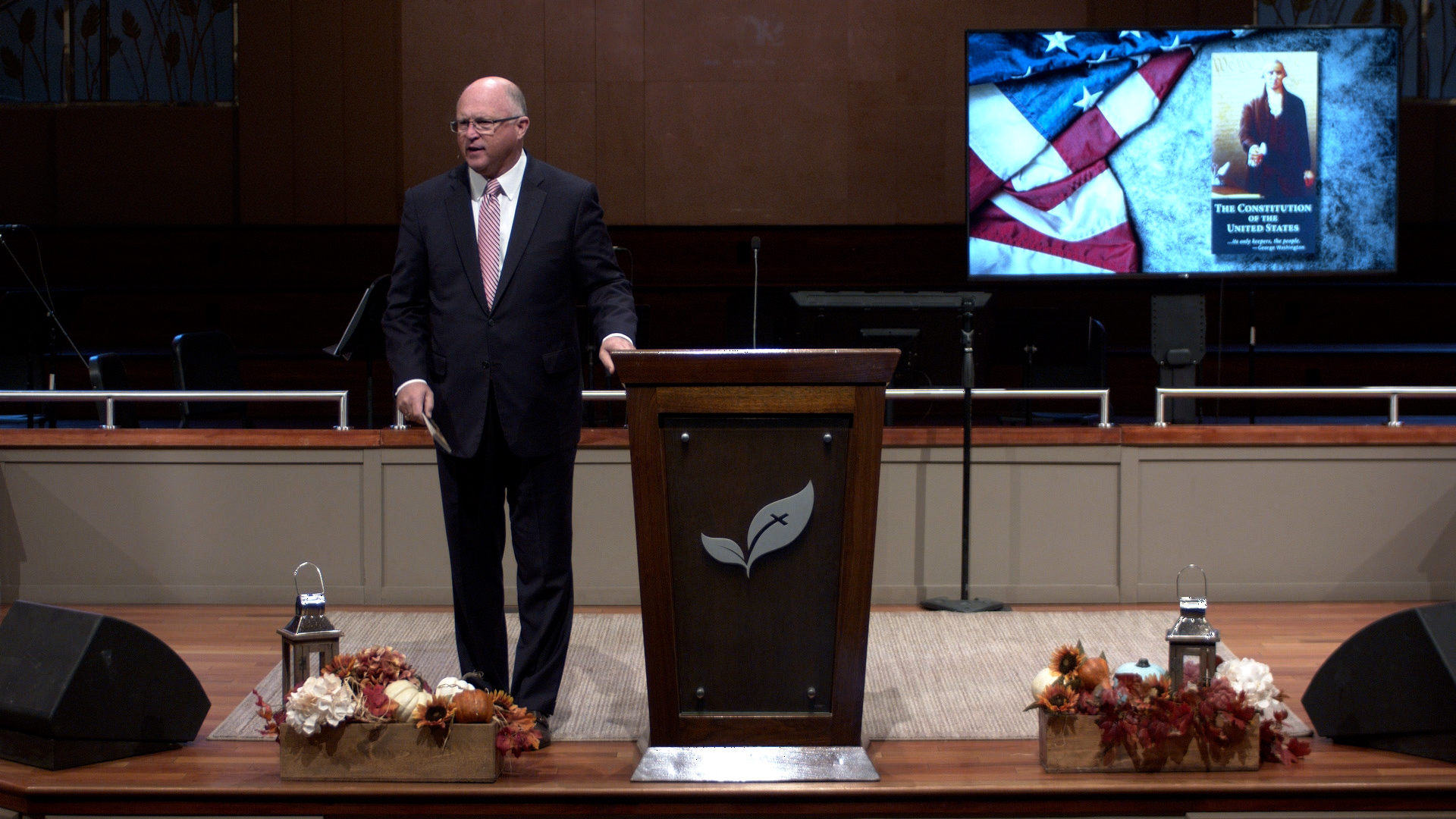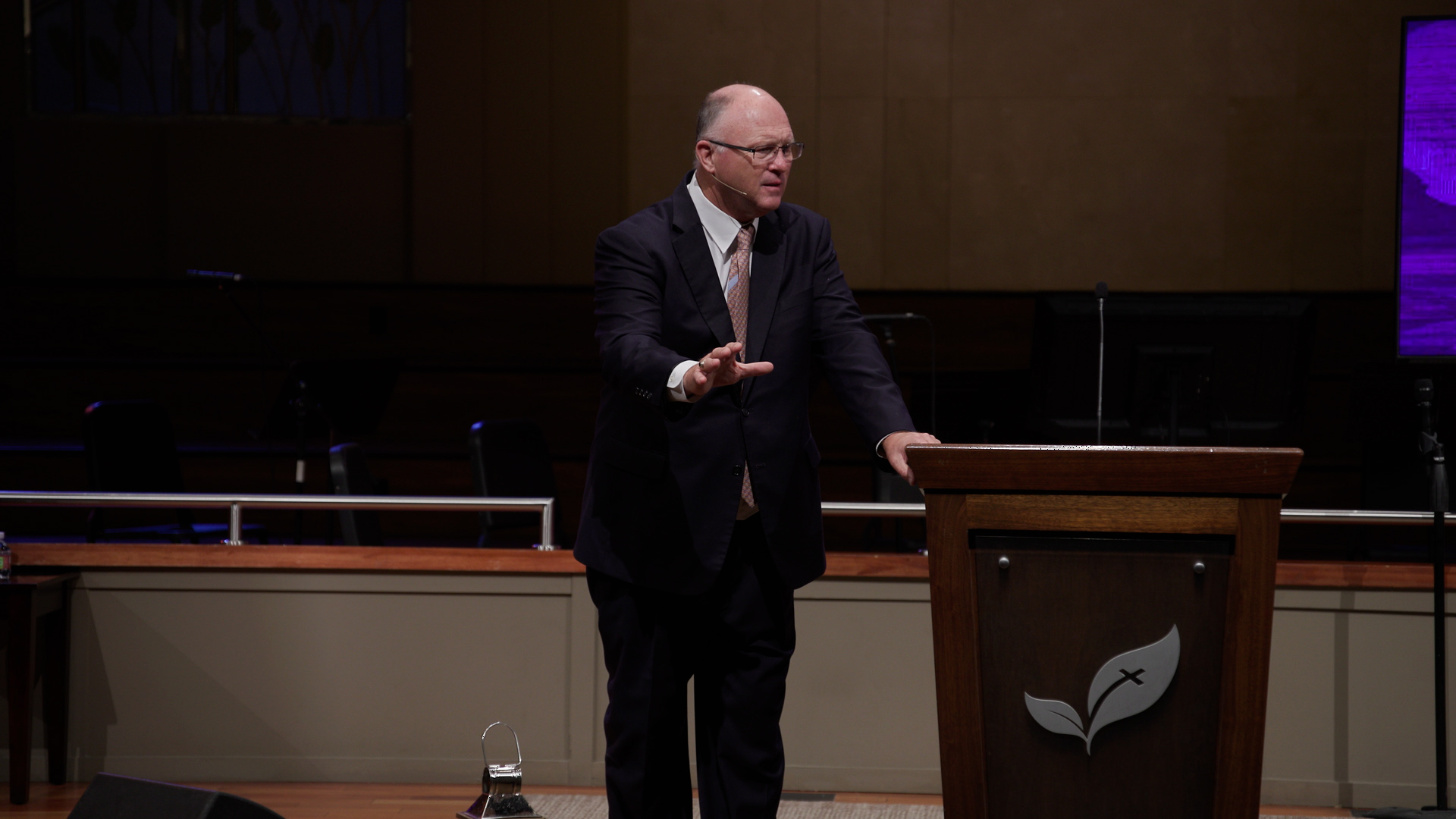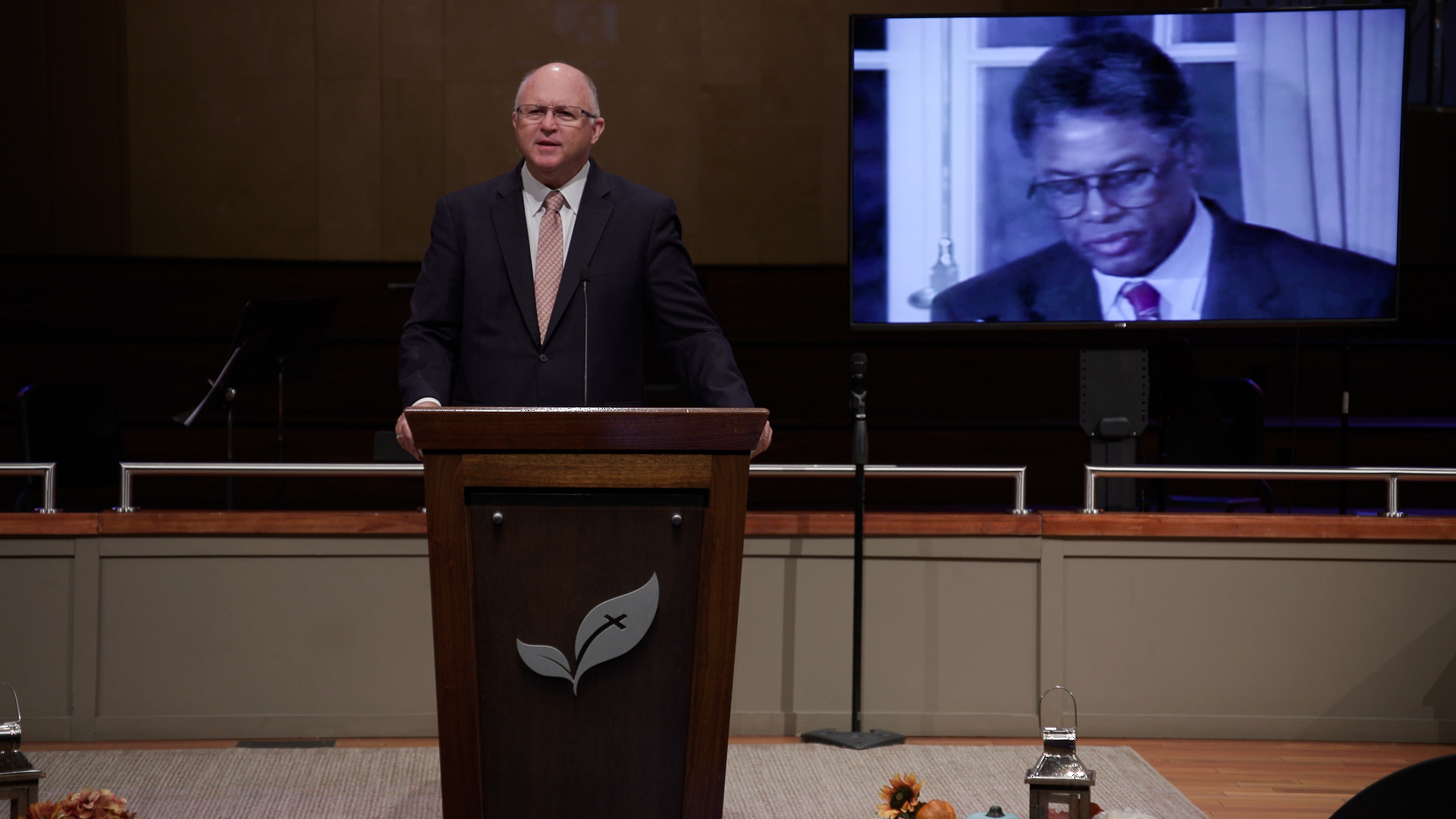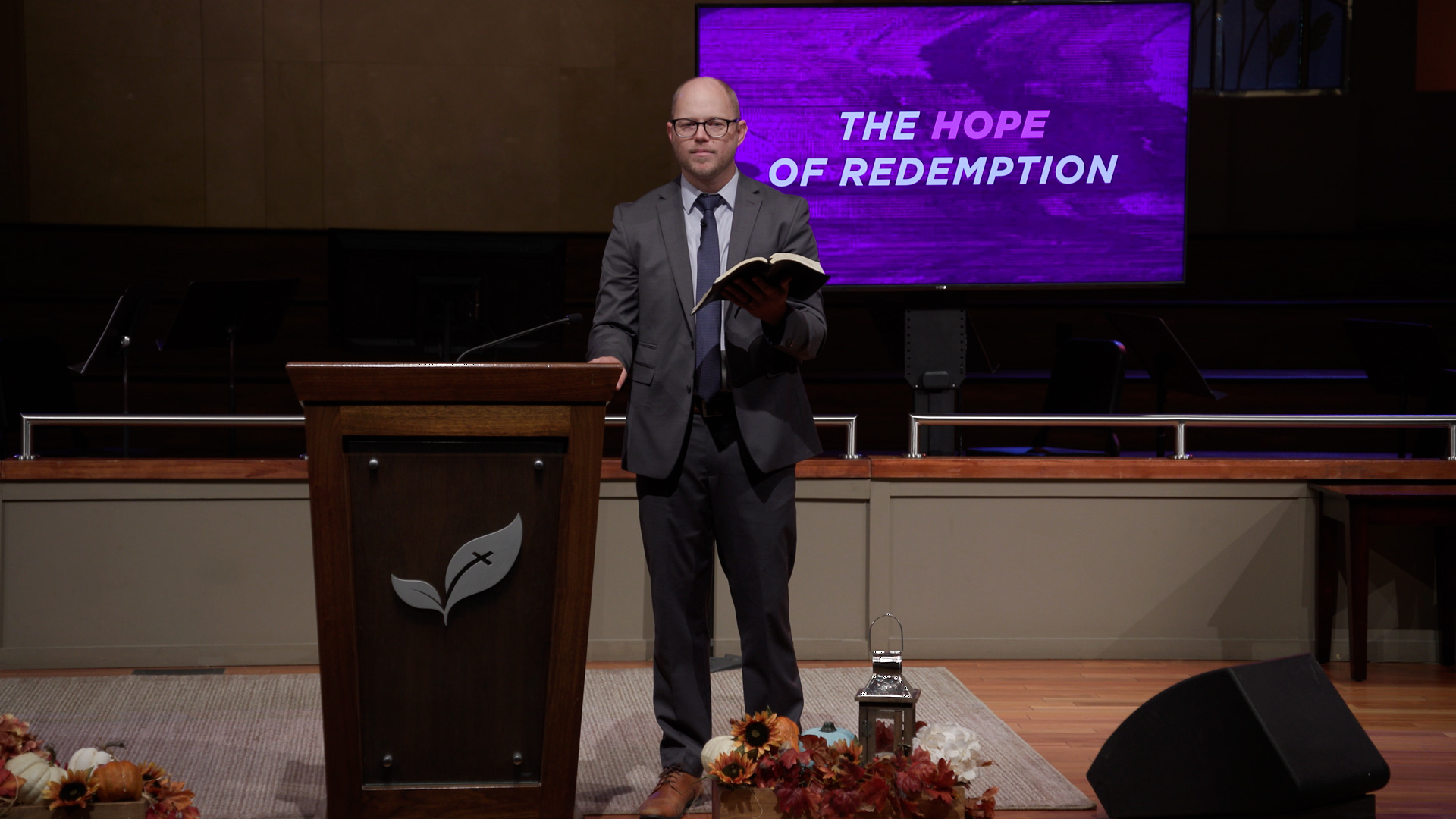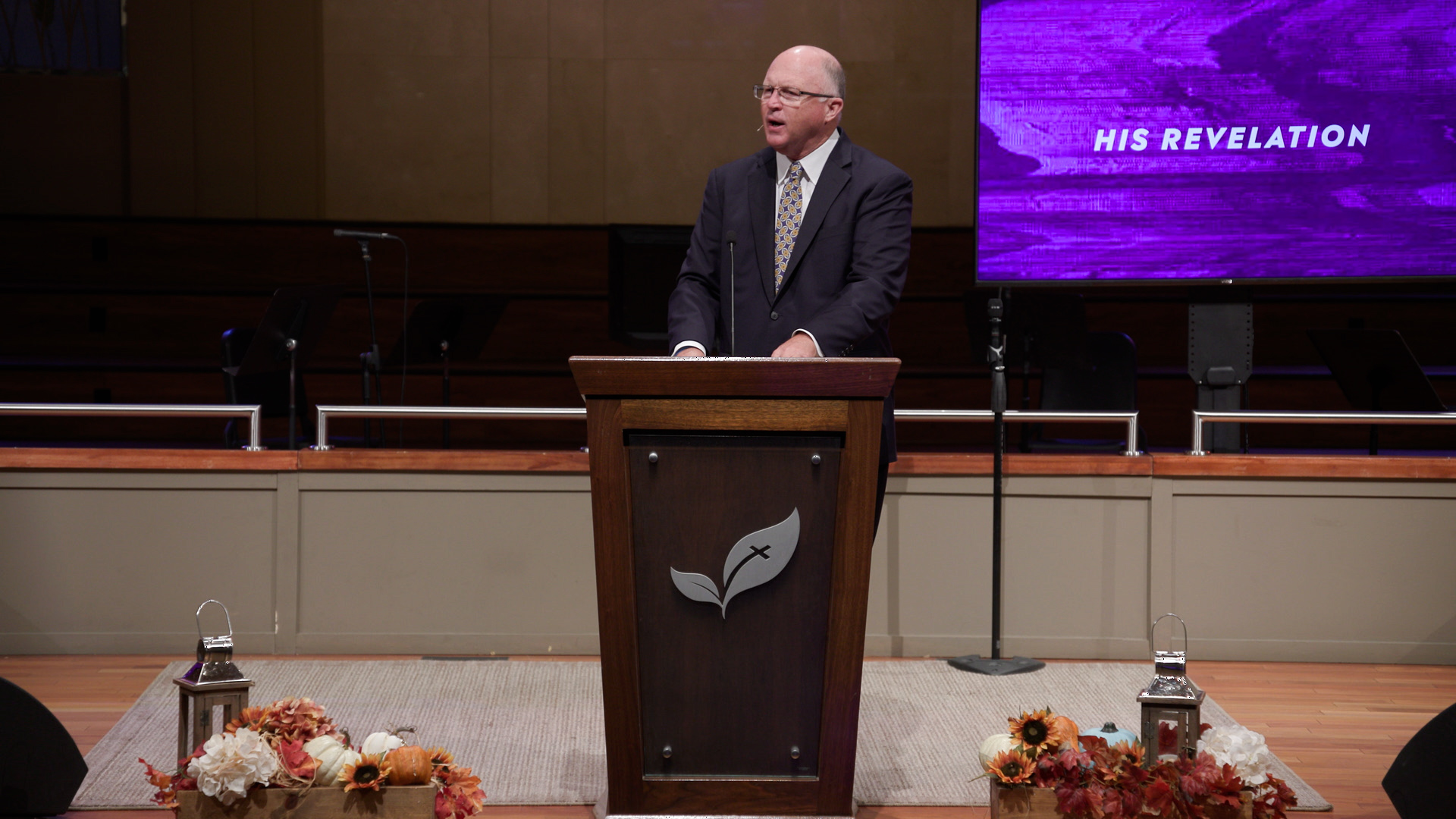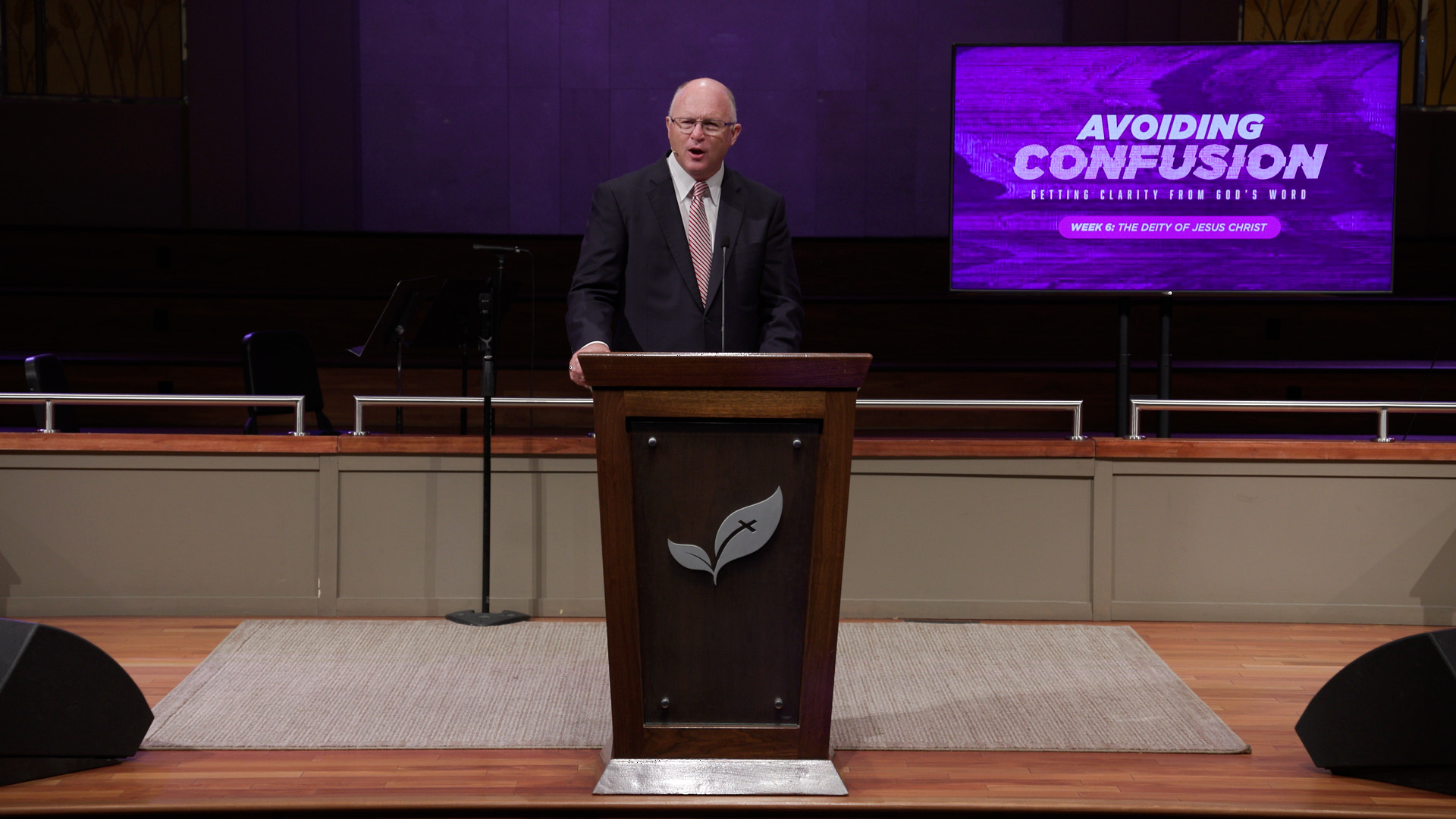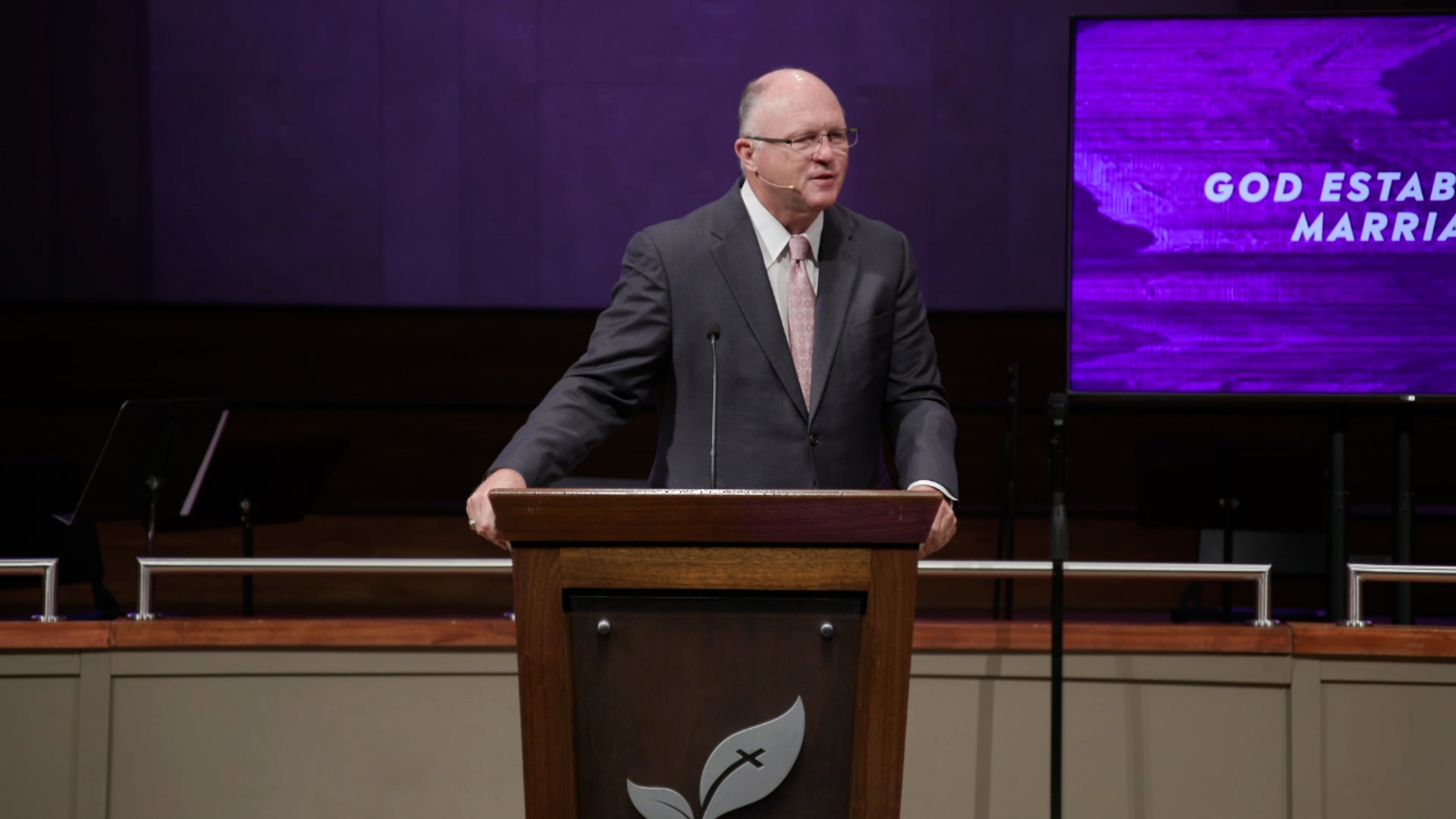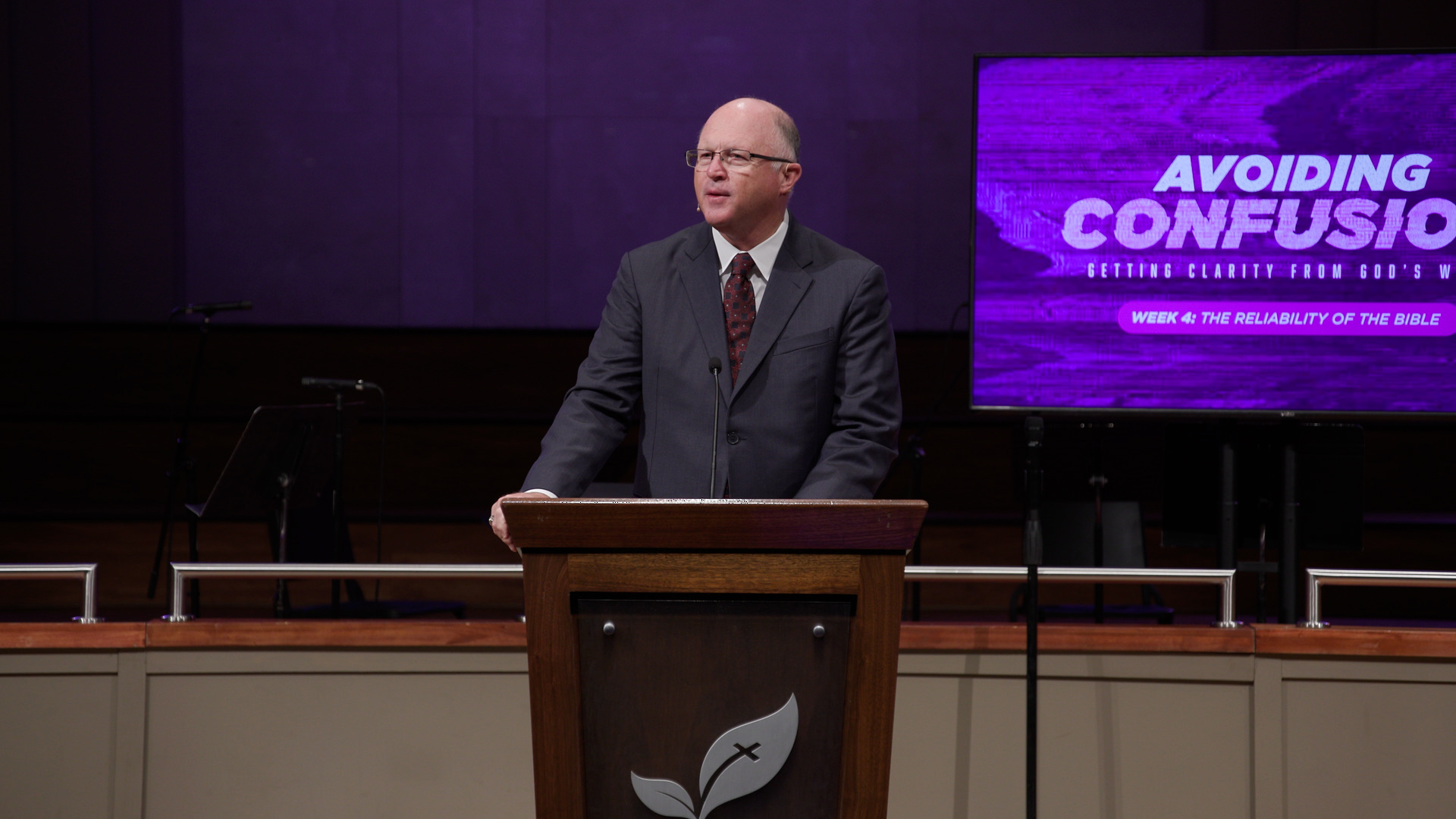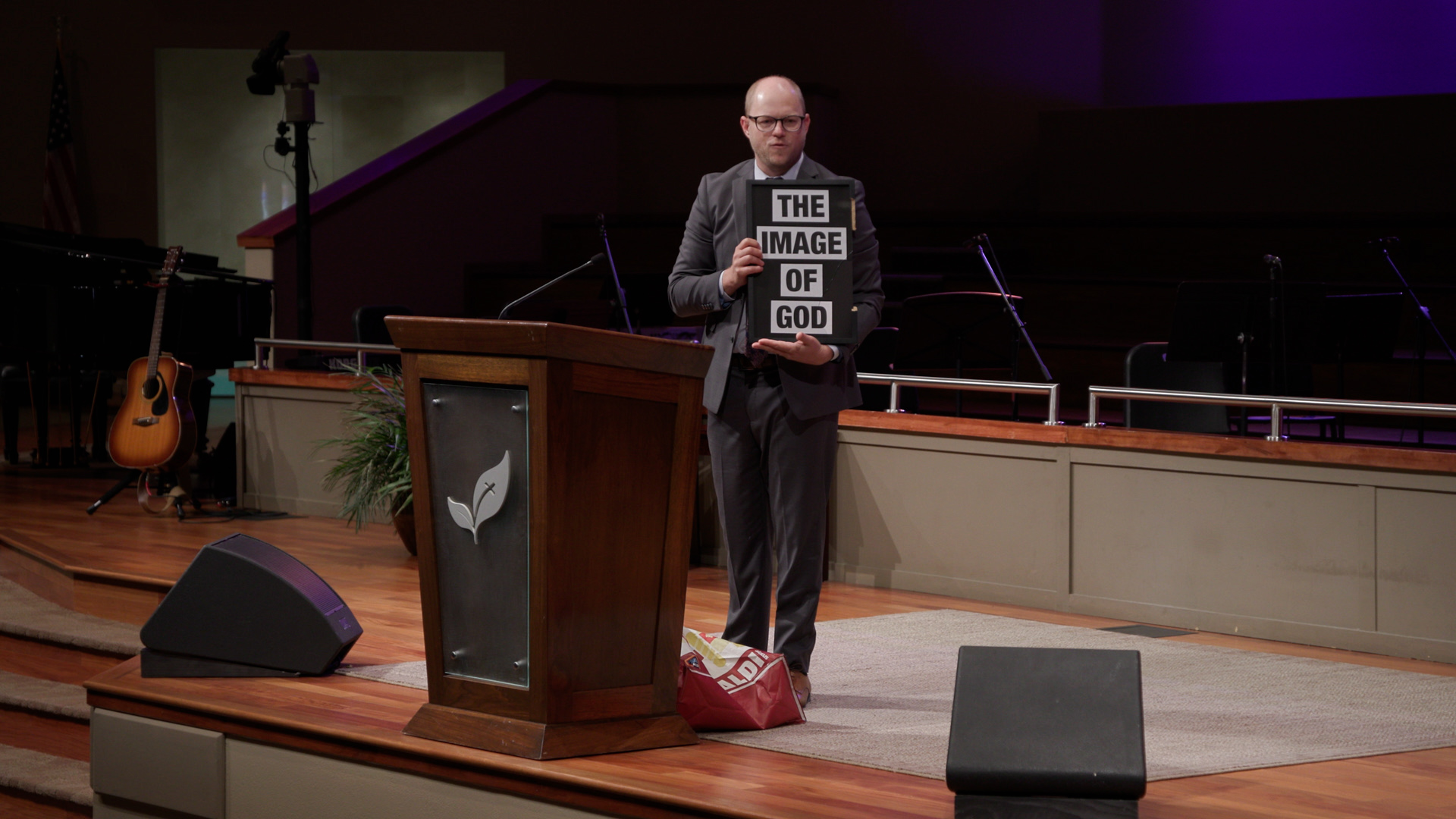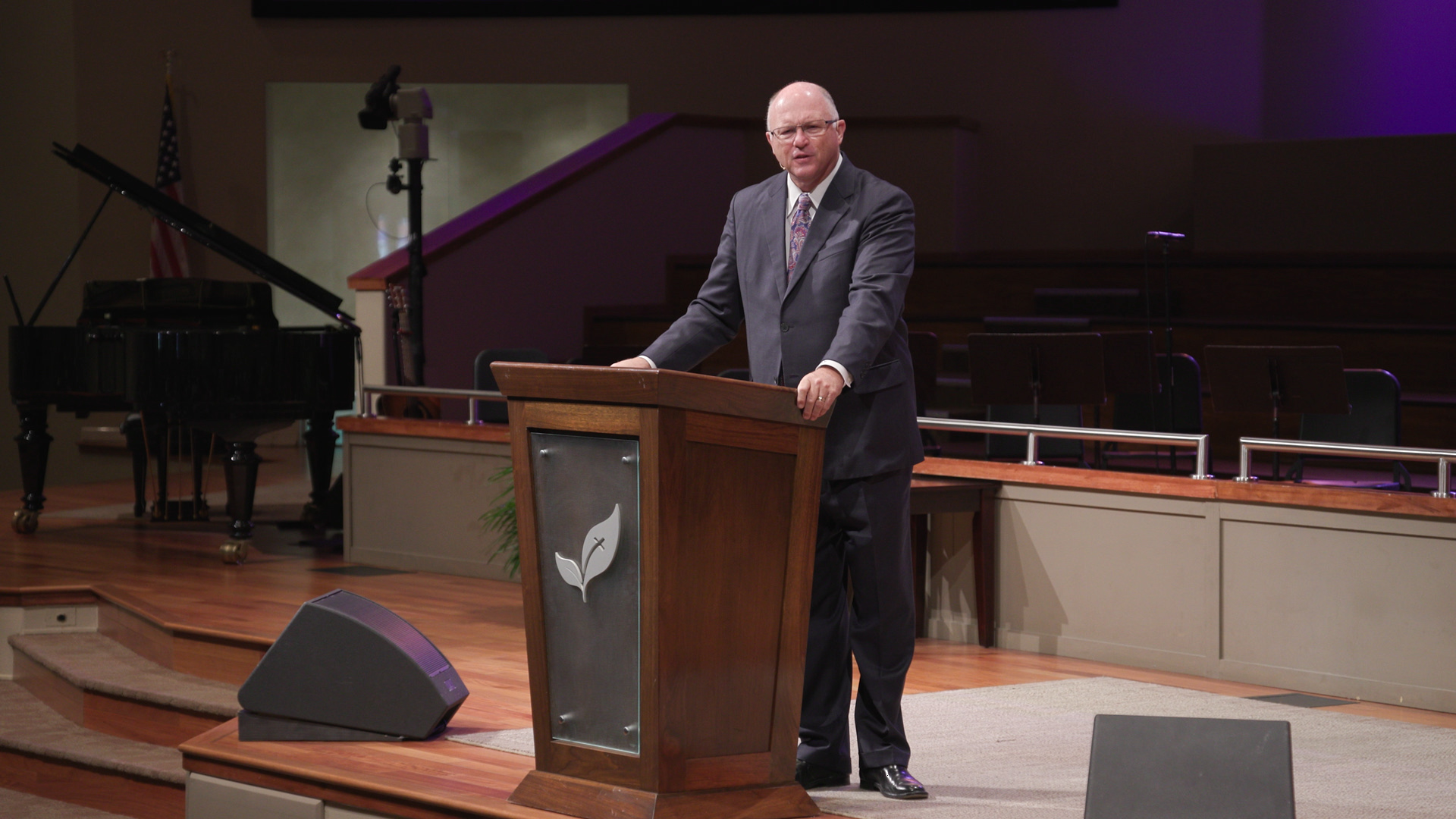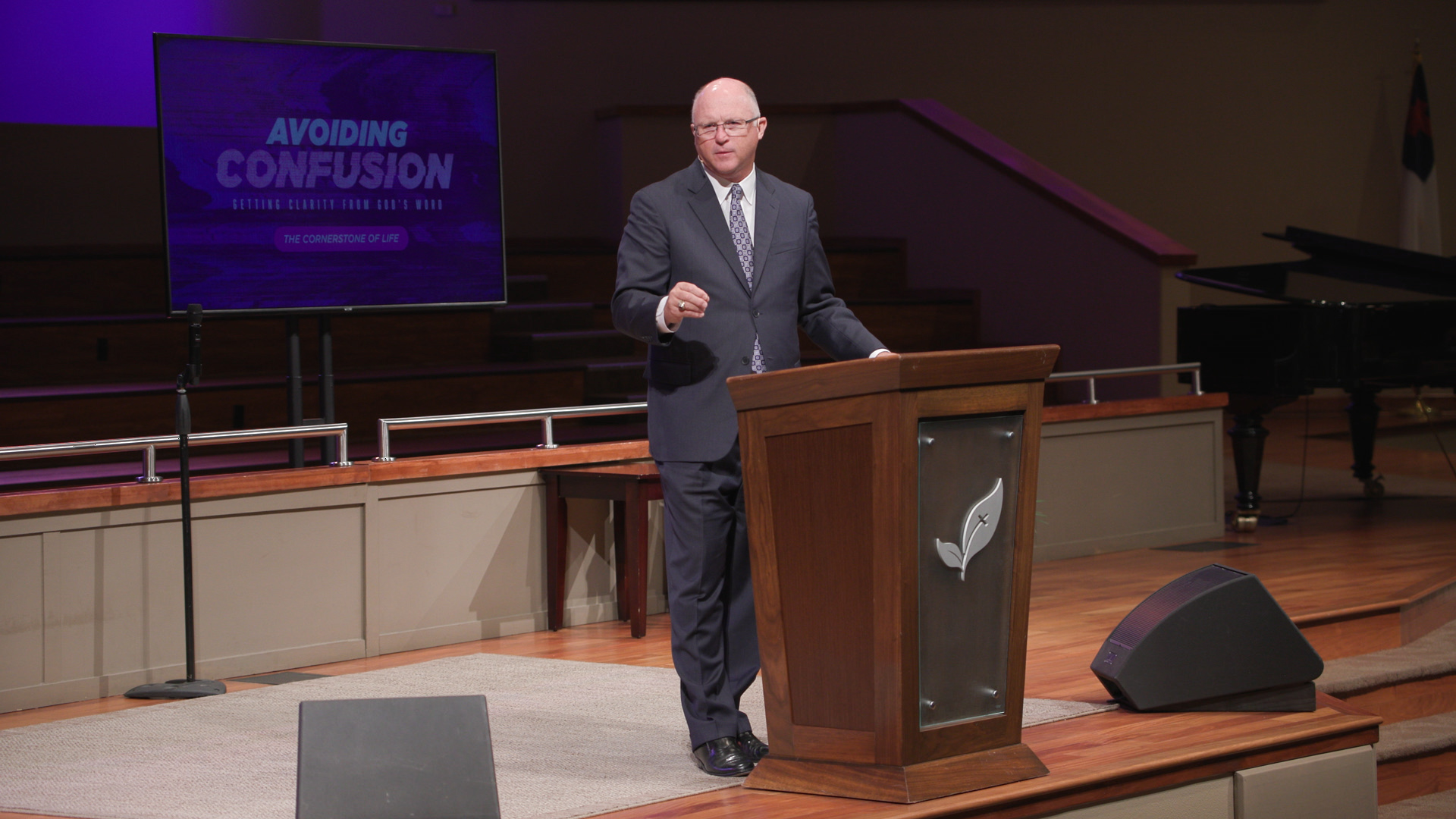Turn to the book of Ephesians chapter 2, Ephesians chapter 2. And I am so excited about this series. I have entitled the series "Avoiding the Confusion." And we're living in confusing times and people have lots of questions, and I know of no greater way to cut through the fog than to turn on the light of the Bible. And so we're going to have a study and a preaching time. Many would consider what we're going to do for the next 10 or 12 weeks is to establish a biblical worldview and to understand the world in light of Scripture. And I really believe this is something that all of us need in this time in which we live; and we're raising families and doing the work of God.
So would you stand with me as we turn to Ephesians chapter 2, and we're going to read beginning in verse 19. And this morning I've entitled the message "The Cornerstone of Life," and you'll see why in just a moment. We're going to establish, Lord willing, the fact that the cornerstone must be set in place if our life is going to be built properly. If our view of this world is aligned properly it's because we're aligned to the Scriptures.
And so, Ephesians 2:19 says, "Now therefore ye are no more strangers and foreigners, but fellow citizens with the saints, and of the household of God; and are built upon the foundation of the apostles and prophets, Jesus Christ himself being the chief corner stone; in whom all the building fitly framed together groweth unto an holy temple in the Lord: in whom ye also are builded together for an habitation of God through the Spirit."
This morning I will preach on this subject "Jesus Christ Himself Being the Chief Cornerstone." Let us pray.
Father, we thank you this morning for the infallible, inerrant, and preserved Word of God. And we would ask today that as we open it that you would illuminate our hearts. I think of so many young people today who are wavering. It's not necessarily the fault of a parent, a church, a school; it's many times the choices that people are making, the inundation of secular relative worldviews coming upon them through various forms of media. But would your Word, Lord, help us. Help us through your Word to cut through all of this today; and throughout these upcoming weeks, strengthen our faith, I pray in Jesus' name. Amen. You may be seated.
Well, this morning we begin a new series: "Avoiding the Confusion: Developing a Biblical Worldview." And there is much confusion in our world, and there will be much confusion, I would say, over the next few months leading into the election period. There's going to be a lot of confusion and challenges and people wondering. There's confusion related to COVID-19. There's confusion about the science. There's confusion about the political side of all of this, and many questions that may not be solved in any near future. There's confusion in our society about gender, and that confusion is fostered by the media questioning young people with respect to whether or not they are created in the image of God, and whether or not they are value or of worth as God created them, or do they need to somehow change the way God created them.
There is, in this culture today, questioning about life, the origin of life: when does life begin, in the mother's womb or not. There are questions and there is confusion about many different topics, even the very topic of God himself, as we see a growing trend toward atheism. And next week I will preach on the proofs for the existence of God. And we see the very questions of the day are causing confusion in the minds of so many who would seek after the truth.
Now when we consider avoiding the confusion there are different terms we might use or analogies we might make. Sometimes we use the term of the paradigm or the view, the worldview. And those of us who wear glasses understand that. We take our glasses off and all of a sudden you are some great-looking people – I've got to tell you that. But you put your glasses back on and reality – no, not reality. But you know what I'm saying. We have a different view, don't we, through our corrective lenses. And what we want to try to do the next several weeks is put on the lens of God's Word and look at the world and see it the way he sees it, the way he would have us to see it.
Another analogy that we see in the Scripture this morning is the analogy of construction. That is to say that as we consider the subject of the cornerstone we are going to learn that if you have your life attached to the right cornerstone then you are going to see a structure that is built with symmetry, a life that is built with biblical beauty and balance.
In the New Testament times a cornerstone was the foundation stone from which the rest of the foundation was fitly joined together. The cornerstone was the biggest stone in the foundation. It was unmovable once it was set in place. By the way, that is the character of true salvation. It's not something that you can take it or leave it. Once you're saved you are settled in Christ. And so, we are going to learn that when Jesus is your cornerstone, life fits together, and the view of life becomes something that is clear because you are affixed to Jesus Christ.
We will learn, as we study today and in these upcoming weeks, that we are made in the very image of God, that we are not an accidental mutation, that we did not evolve, that we are not the product of some big bang, but that God has created us in his image. We are going to learn from Romans chapter 1 next week that God has stamped his awareness into the consciousness of every created being, that within the heart of every man there's a testimony to the existence of God.
You and I will be reminded that we do have a beginning and that is because we have a beginner, someone that brought us into existence. We have a design physically and that is because we have a designer. We have a strong building because and when we have a cornerstone in Jesus Christ. And so God's Word gives a worldview that is sorely needed in the understanding of 18 and 20 and 25-year-olds, and greatly needed in those of us who have been saved for a while, to come back to the basics of the truth of God's Word.
Now there's a battle going on today and the battle that is raging and is affecting every decision that is made, even COVID-19, it is the battle between God's view and the secular view. Everything is filtered through one's paradigm or through one's personal foundation. Every decision is based on what someone has as a life view, as a worldview.
For example, as Christians we believe according to the Scripture that the chief end of man is to glorify God. This is the view that we have of life. We want to bring him glory and to enjoy his fellowship. But the secular view is intent on glorifying self, and self-preservation is what it's all about. It is not just in politics, it's something that's seen everywhere. God's view concerning our lives is that we would be concerned with walking in holiness, that we would walk in his likeness, that we would fellowship with him.
The world's secular view emphasizes only happiness: if it feels good, do it. Relativism gives license to live however one wants to live. And in God's view, he will give to us absolute truth, right? Buy the truth and sell it not. Remove not the ancient landmarks. God gives to his children absolute truth, the secular view is that of relativism. And this is sort of the guideline that many people live by, this idea of relativism. Relativism says that we are just one click better than the animal life, that we really are not able to have the ability to make absolute decisions. Relativism literally allows people to kind of make up the rules as they go, and we're seeing people do that: "I think I want to start a new city in Downtown Seattle. I think I want to live however I want to live, and if I want to change my sexual identity, if I want to terminate the life that's within me, if I want to do whatever."
Imagine if relativism truly took complete control of our culture. Imagine if someone came to a stop sign that you were at this afternoon on the way home or on the way to lunch and they said, "I know there's a stop sign there, but I don't want to stop." By the way, how many of you have ever seen people that that's sort of their philosophy? But imagine if everybody took the relative approach to life and just threw out the absolutes. And that is definitely happening in our society today.
God's view teaches us that emotion in life is a byproduct of our experiencing his truth. Emotion is a byproduct. But the secular view says that emotion is foundational: "If you feel that way, then it's true. If you feel that way about it, that's your foundation."
The Bible teaches us that our feelings are subservient to the absolute truth of God's Word, and that when we know him and his truth, then emotion will come. God's view says that personal sin is something that we are responsible for, but the secular viewpoint on sin is basically that it's someone else's fault: "It's someone else's fault, that's why I'm in jail. It's someone else's fault, that's why I got in trouble. It's someone else's fault, that's why I didn't get the right grade. It was the teacher's fault. It was the guy next to me's fault." But the secular view does not take a personal responsibility.
We're going to learn in these upcoming weeks that according to God's view, all men need forgiveness. Everybody needs the forgiveness, "For all have" – what? – "sinned and come short of the glory of God." But the secular view teaches that man is best. Postmodernism teaches that men do not need forgiveness or redemption, and, "Just look inside of yourself," they say, "and you'll find the truth, and there's plenty of good there."
And then finally from God's standpoint – and we're going to see this repeatedly in Scripture – men everywhere need to repent and turn to the Lord and be saved. But the secular worldview says, "You don't need to repent of anything, just tolerate everything." "Tolerance" is the watchword today.
So the biblical view is repentance. But what you learn in your desensitization classes at work and the children at school and on and on and on through our society is that we must not only tolerate, we must affirm; and not only affirm, we must celebrate all of these different lifestyles and beliefs rather than turn from them. And in this day where many have what is called a "woke" worldview, we see people taking God out of history, God out of psychology, God out of the equations of every academic institution, and because of that, the more that relativism is emphasized, more and more young people are fleeing from and turning from God. Their worldview is being completely changed and it is becoming a godless worldview.
And we're living in a cancel culture so that if you don't accept relativism, then you're going to get your contract cancelled, and you're not going to be able to play on the team, and you're not going to get the promotion. And it's not going to be – I've said this for five years – it's not going to be easier and easier to live the Christian life, there's going to be a testing, there's going to be a purging in these days. And as we live in this cancel culture, if you don't tolerate, if you don't even promote and accept whatever the social messaging might be at a given time, then the cancel culture will take over. And what have we seen? We've seen religiosity on the decline in America for many, many years. In fact, in the past 12 years America has been the least growing nation in the general realm of religion. Of many of the modernized nations America is becoming less and less and less religious with every passing year. Why? Because secularism is winning the battle currently through social media, through the media. People's worldview is no longer being driven through the Scripture, but driven through the rationale of relativism.
There was a study done recently that looked at the decline of mainline denominations. Their specific research on the Presbyterian Church USA lead to the conclusion that the primary reason for the decline was the laity's lack of conviction that Jesus alone was the means of salvation. In other words, majority of the people in the pews of the Presbyterian USA, when they were surveyed did not even have the basic conviction that Jesus Christ alone was the way to salvation. And when you can't get the cornerstone right, it's no wonder that every other thing begins to change. And I'm not talking, again, I'm not talking about preference issues, we're talking about marriage, we're talking about the inerrancy of the Scriptures, we're talking about major issues where entire denominations are falling to liberalism because they are not getting right with respect to who Jesus is and what Jesus Christ has done.
Now, how can we as individuals, how can we as a church, how can the remnant of biblical Christianity in America today avoid the confusion of relativism? The only way possible is to build your life on the rock, on the cornerstone: Jesus Christ.
Now, for many, Jesus is their grandfather's Savior; maybe their Savior. Church and worshiping Jesus is a cultural thing. It's sort of like casserole and grandma and all of that. You've heard the story about the lady that had show and tell for her classroom. And the children came in on the next day for show and tell. And one little girl said, "My name is Mary, and I am a Roman Catholic, and this is a crucifix," and she held up a cross, and everybody said, "Whoa." Another little boy came up and he said, "My name is Benjamin, and I am Jewish," and he held up a Jewish star of David, and everybody said, "Wow." And the next little boy was a Baptist, and he stood up and he said, "My name is Johnny and I am a Baptist, and this is a casserole."
Now that's sort of where people are in some cases with church, right, churches where I see my friends, churches where we have some casserole. But what I'm saying to you is casserole is not going to get you to the finish line faithful to the Lord Jesus Christ. There's got to be something deeper if we're going to avoid the twists and turns of relativism.
One author said, "The decline of Christian identity is particularly pronounced among younger Americans, and fully one-third of those aged 35 and younger report no religious affiliation." And somehow we've got to reach back out to single adults and to the younger generation; and we're doing that here at Lancaster Baptist with a great youth ministry and singles department and soul winning. But all of us need to share this burden together. So I say to you today that if Jesus Christ is not your cornerstone, then there is no guarantee of your faithfulness if your biblical worldview is not founded in him. And so I want to take these next few moments and just really understand the cornerstone and the principle of having the right cornerstone.
Notice, first of all, the reliability of the cornerstone. Why this illustration in Scripture? We know that cornerstones were very costly in the Bible. First Kings 5:17, "And the king commanded, and they brought great stones, costly stones, and hewed stones, to lay the foundation of the house." The cornerstone is an amazingly important and costly part of the edifice of the great houses of the ancient day. And then these cornerstones provide an identity. The size, the quality of the stone establish an identity of the structure that is about to be built. The cornerstone represents the starting place. It is sometimes called the foundation stone. It is a piece of the building that is essential to the integrity of everything else. By the way, Jesus Christ as our cornerstone, that is the essentiality of the integrity of the Christian faith, that Jesus Christ is God in the flesh. This is our cornerstone, and so this piece is essential.
We see here the foundational truth of Christianity, the rock on which our hope is built. It is the only hope of a sinner. It is Christ's atoning work. It is the work of Jesus Christ that is our identity. The Bible says in 1 Peter 3:9, "For we are laborers together with God; for ye are God's husbandry, ye are God's building." The church is a building fitly joined together with Jesus Christ holding all of us together as the chief cornerstone.
So we find identity in the cornerstone. Secondly, we find unity in the cornerstone. The Bible says in verse 21, "in whom all the building fitly framed together." We are fitly framed together, we are joined closely.
Now why are we here right now this morning? And I believe in most cases, it is because we are fitly joined together in Christ. And when we are, there is nothing that can separate us. If we're here with a consumer mentality to get what we can get, COVID's going to drive us completely out of here. But if we're fitly joined together on the doctrinal truth of Jesus Christ, when the dust settles and you look around, we're going to see each other faithfully singing, "How firm a foundation. Amazing grace, how sweet the sound." Can I get an amen to that?
Congregation: Amen.
If we're fitly joined together around him, if Jesus is our commonality, 1 Peter 2:4, "To whom coming, as unto a lively stone, disallowed indeed of men, but chosen of God, and precious, wherefore also it is contained in the scripture, 'Behold, I lay in Sion a chief cornerstone, elect, precious: and he that believeth on him shall not be confounded."
In your Bibles there in Ephesians chapter 4, notice in verse 15, "But speaking the truth in love, may grow up into him in all things, which is the head, even Christ: from whom the whole body fitly joined together and compacted by that which every joint supplieth, according to the effectual working of the measure of every part, maketh increase of the body unto the edifying of itself in love." Even as masonry is fit around that cornerstone, our lives are to be fit around the Lord Jesus Christ, unified around Jesus Christ. And so we are framed together, and in being framed together, we become a spiritual house, this church, a spiritual body, a spiritual house. First Peter 2:5, "Ye also are lively stones." Right? "You are a living stone and you are built up a spiritual house, an holy priesthood, to offer up spiritual sacrifices."
That's why we're here today. In our giving, in our singing, in our attention to the Word of God, we, as a spiritual house, are offering up sacrifices to him, the owner of the house, the Lord Jesus Christ. That is what brings us together today with an identity. Our identity is found in the cornerstone. This is very important. Our identity is found in the cornerstone. Our unity is found in the cornerstone. Our direction comes from the cornerstone.
Which way does this building go? It's not necessarily your idea or mine, it is the church of the Lord Jesus Christ. What direction shall we take? That direction must come from the head of the church: the Lord Jesus Christ. It was most likely that this stone was set in the foundations at the corner to bind together all else in this process. The church of God apart from the person of Jesus Christ is a useless structure. And so the cornerstone sets the identity and sets the direction.
Now years ago, Terrie and I were in our early years of marriage, and we had purchased a home, and we were fixing it up, and she wanted to wallpaper the master bathroom. Now for those of you that are somewhat newly married let me just tell you: wallpapering projects are one of the great tests of marriage. I'm telling you what...
And she wanted to wallpaper the bathroom, and so I bought wallpaper, and we got the little plastic buckets that you run them through, and we was all ready to tackle this project. And she had a snap line, she had a string line that had blue chalk on it. And she's on a little ladder, and I notice she's over here not in the corner, but by the corner snapping a line, and I said, "What are you doing?" And she said, "Well, my dad was a contractor." I said, "I know that." And she said, "My dad said that you never start wallpaper off of a corner because no matter how good the sheetrockers may be they're always off just a little bit, maybe even a half an inch at the corner." And she said, "If you start the wallpaper on the corner," she said, "by the time we get around this room the wallpaper's going to be crooked and it's going to look terrible." She said, "You always start on the straight line." And we started on the straight line, and when we came all the way around the room the wallpaper matched perfectly because we started with a straight line.
And ladies and gentlemen, our straight line is Jesus Christ, and if you don't start with him your life is going to be crooked spiritually. And I tell you that many of the people that we're observing in our society today, they have no line, they have no relationship with Jesus. And many Christians that you see on social media spouting, spouting, spouting, spouting, they are not spouting according to the line, Christ Jesus, they're going every which direction because they're not affixed to the cornerstone. And so the reliability of the cornerstone is so vital.
Secondly, I want you to think about the revelation of the cornerstone. Very quickly, let us see scripturally what this means, the identity of the foundation, first of all. Think with me about the foundation, for the Bible tells us here in verse 20, "We are built upon the foundation of the apostles and prophets." The apostles themselves formed their teachings, the foundation of the Lancaster Baptist Church. Acts 2:42 says, "And they continued steadfastly in the apostles' doctrine and fellowship, and in breaking of bread, and in prayers."
And then we know that Jesus Christ himself is foundational and is the foundation. Matthew 16:18, he said, "Thou art Peter, and upon this rock," – speaking of himself – "I will build my church." And so the foundation is the apostles and Christ. But the cornerstone, the identity of the cornerstone is the Lord Jesus Christ himself. This is prophesied in the Scripture, Psalm 118:21, "I will praise thee: for thou hast heard me, and art become my salvation. The stone which the builders refused is become the head stone of the corner." Isaiah 28:16, "Therefore thus saith the Lord God, 'Behold, I lay in Zion for a foundation stone, a tried stone, a precious cornerstone, a sure foundation: he that believeth shall not make haste.'"
In other words, in the Old Testament God ordained the cornerstone to be the Lord Jesus Christ. And he was and is the virgin-born and yet eternal Son of God. And so it was prophesied. And then this teaching was validated by Jesus Christ himself. The Bible says in Matthew 21:42, "Jesus said unto them, 'Did you never read the scriptures?'" By the way, how many of you would like to have Jesus look at you and say, "Haven't you ever read the Bible?"
He said, "Did you never read the scriptures, 'The stone which the builders rejected, the same is become the head of the corner: this is the Lord's doing, it is marvelous in our eyes'?" Jesus said, "I'm not surprised that you're rejecting me. It's prophesied. It's prophesied that the cornerstone would be rejected." We see the identity confirmed by Jesus Christ. And so we see that there is this revelation of the stone, and it is clearly Jesus Christ in the Scriptures.
And so we turn to the Scriptures, we see the reliability of the cornerstone, the revelation of the cornerstone. But I want you to think with me this morning now about the rejection of the cornerstone, because that's what it really boils down to. Relativism, humanism, atheism is the rejection of Jesus Christ. That is at the root of it all. Jesus has been rejected throughout history.
I think of the days of Noah – we'll reference those next week. I think of the Jewish nation in the first century, Acts 4:10, "Be it known unto you all, and to all the people of Israel, that by the name of Jesus Christ of Nazareth, whom ye crucified, whom God raised from the dead, even by him doth this man stand here before you whole. This is the stone which was set at nought of you builders, which is become the head of the corner. Neither is there salvation in any other: for there is none other name given under heaven, whereby ye must be saved." This stone was rejected of men.
The world hates Christianity and especially Jesus Christ because the Christian faith is an exclusive faith. The Christian faith gives salvation only through the Lord Jesus Christ. Throughout history Jesus has been rejected. And may I say that he is being rejected in our day. And may I say that at the root of much of the emotion that we see; and as I've studied over the years in Christian counseling, whenever there's a fruit problem I always like to see what's the root problem.
Some of you when you see what's going on on the news: "Look at..." that's the fruit. But we need to stop and say, "What's underneath this? What's driving this behavior? What is their cornerstone? Is there a cornerstone?" And in our day we see it.
Lee Strobel in his book The Case for Faith said, "Many people consider it arrogant, narrowminded and bigoted for Christians to contend that the only path to God must go through Jesus Christ of Nazareth. In a day of religious pluralism and tolerance, this exclusivity claim is politically incorrect. It is a verbal slap in the face of other belief system. If you want to be considered a bigoted, narrowminded person, then actually believe what the Bible says in America today."
Someone says, "Well, I don't want that. I'll never get a promotion at work; therefore, COVID's my backdoor out of church." But if Jesus Christ is your cornerstone, you will stand no matter the stigma that may come. And as the world rejects Jesus, they in turn raise up many false gods of their own, and they gather in stadium and hold hands and sing songs of ecumenical dimension to celebrate their false unity that rejects the cornerstone.
Deuteronomy 32:31, "For their rock is not as our Rock, even our enemies themselves being judges. For their vine is of the vine of Sodom, and of the fields of Gomorrah: their grapes are grapes of gall, their clusters are bitter," Deuteronomy 32:31. You see, God's word is simply saying, "Yes, there are other vineyards; yes, there are other gods, but they are false if they reject the cornerstone." First Peter 2:7, "Unto you therefore which believe his is precious: but unto them which are disobedient, the stone which the builders disallowed, the same made the head of the corner." In other words, Jesus is precious to us, that's why we're here this morning. Jesus is precious to us. We love him. We're grateful to him.
The humanists reject God. Not every public school teacher is a humanist, by the way, we have many wonderful public school teachers in our church. But secular humanism is very prevalent in the public educational system in the hierarchy of it. The Humanist Manifesto III – you can look it up yourself, Google it. Humanist Manifesto III says, and I quote, "As nontheists," – that's a nice way of saying, "As atheists" – "we begin with humans, not God; nature, not deity." The motto of the secular humanist is, "Good without God."
And if you look up the Humanist Manifesto III you will find the signatures of those that are in the highest levels of academia in the United States of America: professors from the universities, politicians, people from every walk of life who have signed the Humanist Manifesto, which means that humanism, relativism, atheism is their god. There's no wonder that they could care less about what's happening in this place this morning or why we gather or what's going on with respect to the gospel itself. Man is their cornerstone. They have become their own cornerstone, and they will determine their own lines in life according to relativism.
Liberalism rejects the cornerstone. We've seen this in many ways. We saw this past week at the Democratic National Convention some of the caucuses that refused to say the Pledge of Allegiance, one nation under God. They took out the word "God." You say, "You're being political." No, I'm just stating a historical fact to illustrate to you that humanism is permeating the fabric of the United States of America. When people say, "We're not saying the words 'under God,'" I'm trying to tell you that it is their beliefs that dictate that behavior. It is that they have a different cornerstone that is determining that action.
The United Church of Canada recently dealt with a confounding controversial question. Here was the question, the United Church of Canada: "Can an atheist be a pastor in our denomination?" This is true. "Can an atheist be a pastor in our denomination?" The pastor's name was Gretta Vosper. She made her atheism publicly. "Belief in God," she said, "belongs to an outdated worldview." The United Church of Canada conduct – by the way, if this Bible is outdated, I'm sticking with it. I believe it to be very relevant and up-to-date. It is not an outdated worldview. But that was her conclusion.
The United Church of Canada conducted a cost-benefit analysis and decided that Vosper's heresy was the lesser of two evils. The denomination weighed the faith in God against inclusivity and valued inclusivism higher than theological fidelity and let her keep her job as a pastor even though she did not believe in God. That is the extent to which relativism has invaded even the church houses we sometimes drive by.
You see, if Jesus is your cornerstone, your life spiritually will unashamedly be aligned with him, Romans 9:33, "As it is written, 'Behold, I lay in Sion a stumbling stone and a rock of offence: and whosoever believeth on him shall not be ashamed.'" "For I am not ashamed of the gospel of Christ, for it is the power of God unto salvation to everyone that believeth; to the Jew first, and also to the Gentile." And that is what we need at Lancaster Baptist Church: men and women firmly affixed to the cornerstone, standing fitly joined together with one another through COVID, through war, through difficulty, through riots, standing as the church of God – Jesus Christ himself being our chief cornerstone.
And if money is your cornerstone, then you'll talk of it, you'll live for it, you'll read about it. And if your career is your cornerstone, then you'll march for it and you'll demand for it and you'll live for it. If your race is your cornerstone, you'll talk of it; that will consume you. There's nothing wrong with being thankful for your identity and your culture and all of these things; but what I want you to understand is that there's something that matters more to me than race or money or career, and it is Jesus! And he is the one that binds us together.
If your gender is your cornerstone, then that's all you want to talk about, that's all you want to push. But I'm trying to say for the church of Jesus Christ – listen – there ought to be something greater, there ought to be someone more wonderful, there ought to be something that is consuming our time. What a tragedy that Christians are out standing hand-in-hand and shoulder-to-shoulder with God-denying humanists and atheists and those that would change the gender of your very children, when we ought to be taking gospel tracts and preaching the blood of Jesus Christ to a lost and dying world. Let's not lower ourselves to some cause of lesser importance. There is no cause greater than the cause of Jesus Christ; and I will not come down from the wall of preaching the gospel of Jesus Christ.
May this pulpit never be a place where the message borders on relativism, inclusivity, and all of the tolerance doctrines of this day; may we always be lifting Jesus Christ above everything else. If Jesus Christ is not God, then Jesus Christ is not the Savior of all men. But if Jesus Christ is your cornerstone, read his love letters, worship him, tell others about him, live for him, give to him, shout for him, praise for him. Jesus Christ is worthy of our very best.
So this is what we're going to learn: "Is our worldview based on Jesus or some other identity? Do I view this world" – and sometimes we just grow up. And, yes, sometimes we grow up viewing life through our race, and that can be bad. Sometimes we grow up viewing life through money and gain and fame, and that can be bad. How do we view our life? I propose to you that all of us, no matter what our socioeconomic background, no matter what our culture background: if we're saved, that's the differential. And we should view our lives not through those other experiences, we should view our lives through the lens of God's Word; that's how to view our life.
And so that's what we're going to learn these next few weeks: "What is your worldview?" And I want to ask you to be willing not to let me convince you. A man persuaded against his will is – what? – unpersuaded still. But let the Lord convince you. Let the Scriptures guide you, because all of us – myself included – I'm going to tell you probably need to have our view adjusted more to the light of Scripture than it is right now. Can I get an amen on that?
Congregation: Amen.
And if we'll all get adjusted to the cornerstone, this is a strong and a mighty lighthouse for the Lord Jesus Christ. And if we don't, this is what happens to families and even to churches and to denominations that get it wrong. One passage as we close. Turn to Matthew 7:24. Matthew 7:24.
Matthew 7:24, "Therefore whosoever heareth these sayings of mine, and doeth them, I will liken him unto a wise man, which built his house upon a" – what?
Congregation: Rock.
"And the rain descended, and the floods came, and the winds blew, and beat upon that house; and it fell not: for it was founded on the rock. And everyone that heareth these sayings of mine, and doeth them not, shall be likened unto a foolish man, which built his house upon the sand: and the rain descended, and the floods came, and the winds blew, and beat upon that house; and it fell: and great was the fall of it."
You remember the song, don't you, don't you? "The wise man built his house upon the rock, the wise man built his house upon the rock, the wise man built his house upon the rock, and the rains came tumbling down. The rains came down as the floods came up, the rains came down as the floods came up, the rains came down as the floods came up, and the house on the rock did" – what? – "stood firm." I won't sing the other verses, I'm not sure you can handle it.
You build your life on the sands of relativism, humanism, evolution, your life is going to disintegrate in the storm. Run to the rock, my friend. No, America's not perfect. No, Christians are not perfect, and people will disappoint you. But Jesus never will fail you. Build on the rock.
Not long ago there was a young man. I was speaking with him and his family. He'd been surfing the Web. He'd seen a lot of anti-Christian rhetoric. He'd been to the Antelope Valley College, he'd been to a class or two comparing religions. He began to have questions about creation, sexual identity. He began to say, "You know, I think I'm maybe an agnostic. Maybe there's a God, but I'm not sure you can really know him."
Relativism, finding root, potentially walking away from the truth. Some would say, "Was he ever saved?" That's something that only God knows. But what I can tell you is this is the time to get your life firmly affixed to Jesus. And by the way, for someone in here this morning, that may begin with you turning to Jesus Christ and saying to him, "Lord, as a sinner I'm not going to continue to justify myself and say I'm okay. But, Lord, I'm coming to you because you are the eternal Son of God, and I ask you to forgive my sin. You died on the cross for my sin. I'm asking you to come into my life and be my personal Savior."
And when you are saved, when you accept Jesus Christ as your Savior and you know that you are now affixed to him as the cornerstone of your life, things will begin to straighten out, my friend. You're not going to straighten it out without him. If there's someone like that today, I encourage you to trust Jesus Christ as your Savior, even today. And, Christians, I'm just telling you: many, many thousands of members, even of this church, need to have a stronger biblical worldview moving into these last days, or we're going to turn around and go, "Where did they go?" Make sure that you're building on the cornerstone.
[End of Audio]

